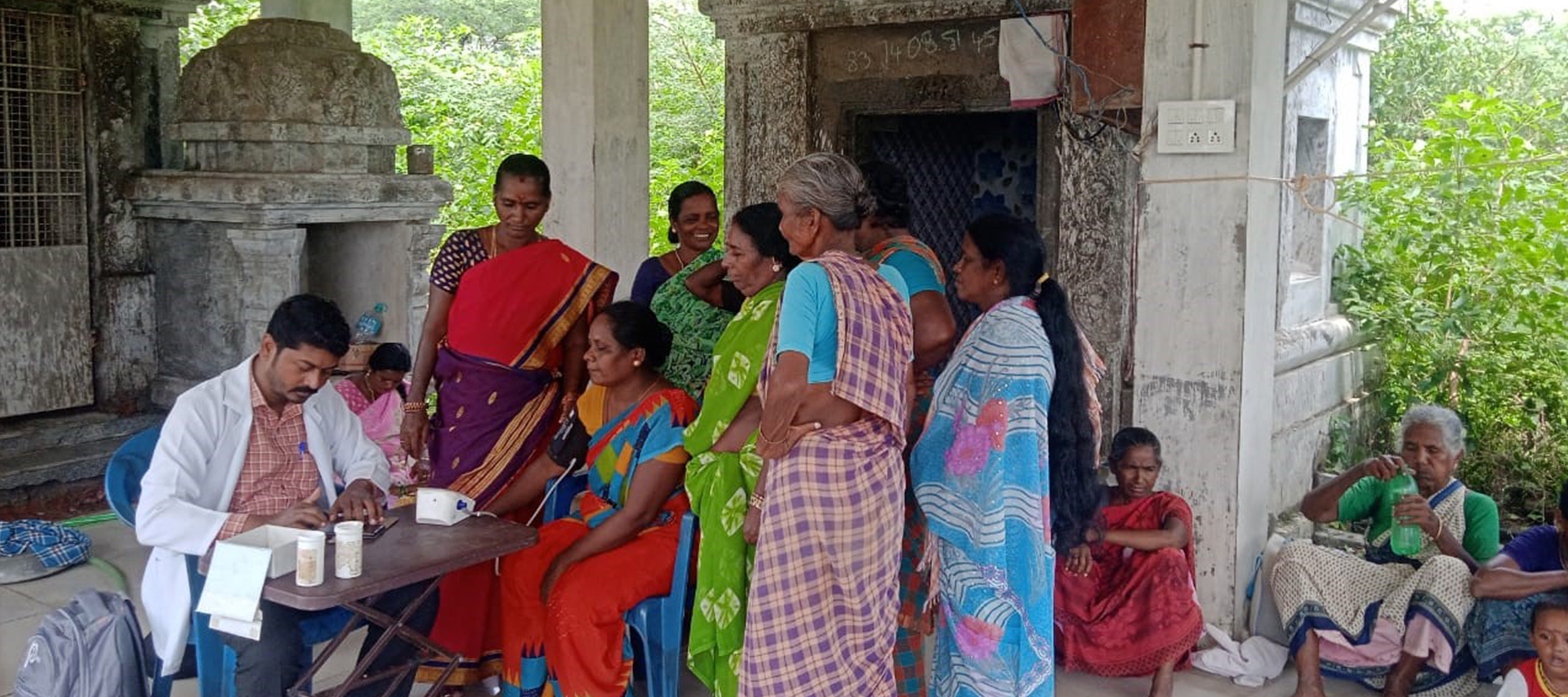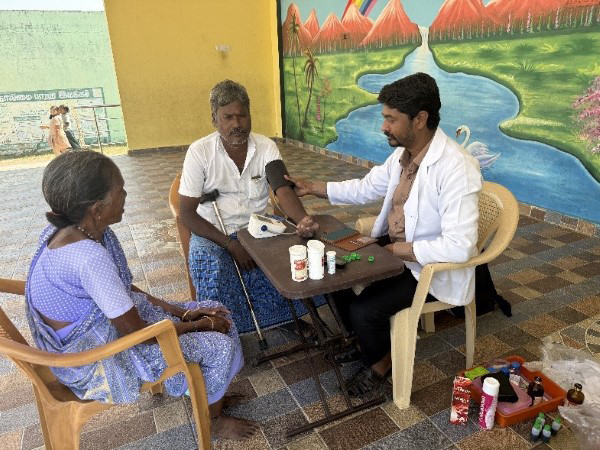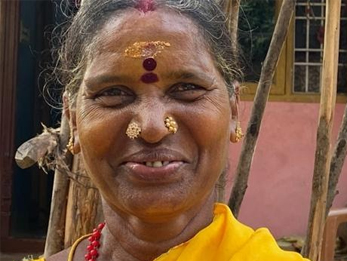Tamil Nadu faces a rising burden of non-communicable diseases (NCDs) such as stroke, Type 2 diabetes, cancer, and heart disease. Studies reveal high rates of diabetes and hypertension, low nutrition levels among adolescents, and a lack of awareness about health conditions among the population. These issues pose significant challenges to the well-being of communities.
Recognising these gaps, CRUSADE addresses health concerns through its Women Self-Help Groups (WSHGs), support groups of PwDs (Persons with Disabilities) and Elderly women groups. The programme creates awareness, identifies individuals with health issues through surveys, organises regular treatment & screening camps, train them to use herbal medicines and refers patients to government or private hospitals when needed.
The initial days of the programme were challenging—convincing communities to prioritise their health, accept homeopathy system of medicine and reaching remote areas required persistence. Over time, CRUSADE built trust and established itself as a reliable partner. Jothiramalingam, the Secretary of CRUSADE, explains, “CRUSADE has earned a reputation for sincerity, listening, and taking a people-centred approach to health needs. Our work is both rewarding and fulfilling.”
A People-Centred Health Programme
CRUSADE operates a robust community-based health programme across four blocks—Minjur,
Sholavaram, Ellapuram and Gummidipoondi.This innovative model supports women in SHGs
and their families, PwDs (Person with Disability) and Elderly women in support
groups enabling them to address health challenges cost-effectively. Over 50,000 community members have access to improved healthcare services, empowering them to break the cycle of poverty and ill health and lead better lives
Data-Driven Approach
To better understand the health needs of women and their families, CRUSADE conducted a health survey in 30 villages. The insights from this survey helped structure programmes that address the community's most pressing healthcare challenges.
CRUSADE's comprehensive healthcare programmes include:
Awareness Creation
Mobile Clinics and Women’s wellness camps
Medical Camps
Adolescent Health Care
Herbal Medicine
Diagnosis & Treatment
Elderly Women's Medical Care
Story
Awareness creation
Health awareness campaigns are at the heart of CRUSADE's model to address the region's growing burden of non-communicable diseases (NCDs). By equipping women in Self-Help Groups (SHGs) with essential health knowledge, CRUSADE transforms them into catalysts for change within their communities.
These women take charge of their health and inspire their families and neighbours to seek early treatment for health issues.
The approach recognizes the critical role women play in shaping the well-being of their families. Studies show that women with greater autonomy are more likely to seek healthcare and utilize available resources. By leveraging SHGs, CRUSADE fosters this autonomy, helping women make informed decisions about their health and that of their loved ones.
Structured Training
CRUSADE's healthcare workers use structured, localized training modules designed to make complex health topics accessible. These modules are created in the local language and feature pictorial explanations, ensuring clarity and engagement. Periodic revisions based on feedback from CRUSADE staff and health workers keep the content relevant and impactful
The training is carried out by seven cluster-level staff and 11 female health workers under the close supervision of a medical officer. This hands-on approach ensures consistency and quality across sessions.
Nutrition awareness diet modification
CRUSADE conducts regular camps in villages and schools to increase awareness through health educators. We also educate the parents on the importance of providing nutritious food that is readily available in the villages.
Health Volunteers equipped with First Aid Kits.
CRUSADE trained Health volunteers infirst aid and provided kit. They act as a first point of contact for patients with minor ailments or injuries and send them to nearby Government hospitals for further followup/treatment.
Mobile Homoeopathy Clinics
CRUSADE runs mobile homoeopathy clinics in villages, offering curative, preventive, and referral services. These clinics ensure health services reach a significant number of people.
A homoeopathy doctor visits 36 villages once every three months. The doctor examines and distributes medicines for minor ailments, which are provided free of costand refer patients to nearby Primary Health Centres or other facilities for severe conditions.
In addition Female Homoeopath conducts Women’s wellness camps exclusively for Women in 13 more villages addressing unique health problems of women. These camps are tailored to focus on a variety of female specific health issues such as menstrual & reproductive complaints, besides hypertension, diabetes and anaemia.
In collaboration with Venkateswara Homeopathy College and Hospital CRUSADE facilitate similar medical clinics in six more villages in one block-Ellapuram
The clinics commonly treat:
- Knee joint pain
- Osteoarthritis
- Diabetes
- Hypertension
- Heel pain
- Thyroid issues
- Skin complaints
- Menstrual problems
- Gastric ulcers
- Bronchial asthma
- Sneezing
- Low back pain
Knowledge that changes lives
"What you are teaching us here today remains with us," says Rani, a SHG member. "Knowledge is the only thing that can change lives and broaden our thinking. Learning about remedies for common illnesses and understanding how our body works are vital for leading a healthy life. Thank you for this training."
"Mrs. Nirmala, a resident of Kaniyambakkam, can now relish her favourite dishes without worry or discomfort, a stark contrast to her struggles just a year ago.
Her ordeal began with a sudden, excruciating abdominal pain after a heavy meal. Alarmed, she rushed to the hospital, where a USG (ultrasound) scan revealed she had cholelithiasis, or gallbladder stones. Doctors prescribed medications and warned that frequent, severe pain might necessitate a cholecystectomy (surgical removal of the gallbladder). The thought of surgery and the lingering pain left her anxious and disheartened.
"
During a village meeting, a CRUSADE cluster coordinator noticed her sadness and approached her to understand the cause. Upon hearing her story, the coordinator encouraged Mrs. Nirmala to consult the homoeopathy mobile camp that visited their village every three months. Sceptical but desperate for relief, she decided to try the alternative approach.
Under the guidance of the visiting homoeopath, Nirmala began treatment tailored to her condition. Over the next year, she attended regular follow-ups at the mobile camps. Along with homoeopathic remedies, she received comprehensive advice on healthy eating, a customized dietary plan, and lifestyle modifications to aid her recovery.
As months passed, Nirmala experienced steady improvements. Symptoms such as sour eructation, abdominal bloating, and pain subsided significantly. She gained confidence and embraced the new dietary habits suggested by the homoeopath. A recent USG abdomen scan revealed a considerable reduction in the size of her gallbladder stones.
Today, Nirmala lives without fear of surgery or pain. She enjoys her meals and shares her experience with others in her community, encouraging them to explore the holistic and effective care provided by the homoeopathy mobile camp. Her journey is a shining example of how accessible and personalized healthcare can transform lives.
Overcoming Fear and Pain: Mrs. Nirmala’s Homoeopathy Journey
Women’s wellness
Selvi is 53 years old resides in Chinna Anuppambattu village,Minjur block. Selvi suffers Menorrhagia(profuse menstrual bleeding), but was scared to seek medical advice for the fear she may be diagnosed with a fibroid (tumours in uterus) and thought she might have to undergo Hysterectomy (surgical removal of uterus) if the diagnosis was fibroid.
Selvi visited women’s wellness camp organized in the village with the hope to get a solution for the problem. Selvi was given Homoeopathic medicines for her complaints and was explained the various causes for menorrhagia and need not be due to fibroids. She was also advised to first undergo Ultrasound of the pelvis to rule out the cause. Her ultrasound was normal without any growth. During the second visit to the village Selvi was the first person to attend the camp as her symptoms have reduced to a large extent and she was made to understand that her symptom could be of menopause which happens due to hormonal changes. She was relieved that she need not undergo Hysterectomy and has now collected medicines for general weakness.
Medical Camps
Medical camps are organised in the project villages to improve health and wellbeing of the people by early detection of diseases and promoting healthy lifestyles. These camps are a way to help underserved population and reduce the burden on healthcare systems. CRUSADE organises various screening and treatment camps in its project villages either free or at nominal cost to make people access to health.
Health Screening Camps
CRUSADE brings essential healthcare services closer to communities in project villages through screening camps for non-communicable diseases such as diabetes, hypertension, cataracts, cancerand dental issues. These camps save villagers the time and cost of seeking medical care away from their villages while promoting early detection and timely treatment.
Diabetes and Hypertension Clinics
People with symptoms of hypertension and diabetes are tested at mobile clinics to identify new and borderline cases. After that, the doctor advises on a diet regimen ®ular exercise. Patients under treatment are monitored for blood glucose levels; check-ups are recommended once every three months. "I am sixty years. It's the first time I have tested. The doctor told me that my sugar levels were high. I am under medication now with an exercise regime and diet control. We are grateful for such camps held in our villages,” says a woman from one of the villages.
Cancer Screening Camps
Breast and cervical cancer are among the leading causes of cancer-related deaths in women, yet both are highly preventable if detected early. Unfortunately, rural women often face a lack of awareness and testing facilities, leading to delayed diagnosis and tragic outcomes that profoundly impact their families.
In collaboration with Penn Nalam Hospital, Chennai, CRUSADE organises awareness and screening camps for women in Self-Help Groups. Women requiring further evaluation or treatment are referred to government or private hospitals. By bringing these services directly to their villages, CRUSADE has encouraged more women to take proactive steps toward cancer prevention and care.
Eye Camps
In partnership with Agarwal Eye Hospital, Chennai, CRUSADE conducts eye camps that address cataracts and refractive errors, improving vision and enhancing quality of life. Patients requiring advanced care, such as cataract surgeries with intraocular lens (IOL) implantation, are referred to the base hospital.
CRUSADE also arranges spectacles for those with refractive errors at a nominal fee, making vision correction accessible and affordable for all.
STORY
In the quaint village of Athoormedu, nestled in the Sholavaram block, Mrs. Geethanjali—a dedicated mother and a skilled tailor—embarked on a journey of resilience and empowerment. A proud member of the Mulla Women’s Self-Help Group since 2005, she has tirelessly supported her family, especially her differently-abled son with Down’s syndrome.
With tailoring as her livelihood, Mrs. Geethanjali’s dexterous hands brought life to fabric, stitching dreams for her neighbours and friends. However, her world began to dim when she struggled to perform simple tasks like threading a needle or stitching at night. Delayed deliveries and personal frustration weighed heavily on her. Compounding this, she often stumbled on uneven paths while accompanying her son on evening walks, making her fear for their safety.
Understanding the impact of her vision challenges, she shared her struggles with CRUSADE’s cluster coordinator. Encouraged to attend an eye screening camp organized by CRUSADE in collaboration with Agarwal Eye Hospital, Mrs. Geethanjali hesitated, worried about leaving her son alone. But reassurance about the camp’s proximity and efficiency finally persuaded her to attend.
The eye camp proved to be a turning point. Diagnosed with vision impairment, she was prescribed spectacles. CRUSADE provided them at a nominal cost, ensuring affordability for the family.
Today, Mrs. Geethanjali’s life has transformed. With her clear vision restored, she stitches with precision and delivers on time, earning the trust and gratitude of her customers. Her evenings with her son are no longer fraught with fear but filled with joy and confidence. Her husband proudly acknowledges the positive changes, attributing them to her membership in the Women’s SHG and CRUSADE’s timely intervention.
Mrs. Geethanjali’s story is a testament to the power of support, timely care, and the unwavering spirit of a mother striving for her family’s well-being. Through the efforts of CRUSADE and the strength of her community, she has not just regained her vision but also reclaimed her independence and hope.
Elderly Women's Medical Care
CRUSADE has formed women's groups since the early 90S, and many women in the groups have attained superannuation status and are, therefore, not able to continue in the groups (as they cannot save money regularly and pay subscriptions, etc.),
nor do they have access to medical care and other services as they are no longer part of WSHGs. However, elderly women are vulnerable to health and loneliness problems, mobility issues and financial insecurity. Although many of these women live with family, they are often neglected and require constant attention and company who can support them with their small and vital needs.
Tamil Nadu has the country's highest number of 'single woman' households. Data released by the Registrar General and Census Commissioner of India reveals that about 8.11 lakh women in the state live alone, which means 4.39% of the total 1.84 crore (18.4 million) households of the state are one women households. These women could be divorcees, widows or spinsters; not at all women in these households were living alone by choice, but due to various reasons such as victims of desertion, domestic violence, dowry, etc.
CRUSADE has formed 25 groups with 425 elderly women enrolled. Health professionals visit the groups every three months to provide medical care and diagnostic services.

















